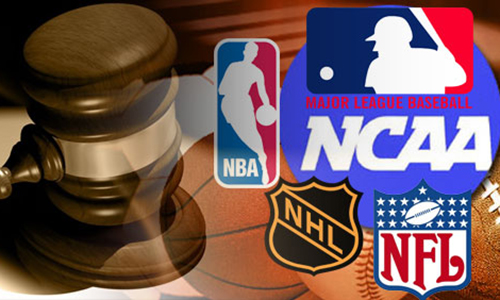New Jersey Files Response in Support of SCOTUS Sports-Betting Writ
Legal skirmishes continue as the Supreme Court of the United States [SCOTUS] continues to weigh whether it will accept a full appeal of the “Christie II” New Jersey sports betting case. SCOTUS’s nine eight judges are set to announce their decision in a few weeks, while the briefs opposing and supporting the Third Circuit appellate decision continue piling up in SCOTUS’s metaphorical inbox. Among the most recent filings is a brief assembled by the state’s counsel reaffirming the main legal arguments the state believes require the Supreme Court to pick up the case, in particular the “commandeering” argument wherein New Jersey continues to assert that the federal-level PASPA [Professional and Amateur Sports Protection Act] unconstitutional nullifies rights that are the domain of individual US states.
 In the latest filing by New Jersey, submitted last week, the state continues to attack the exceptional, perhaps illegal nature of the PASPA prohibition itself. PASPA may be the only long-standing law on the US’s federal books that usurps traditional states’ rights in such a manner; many such laws are passed, but almost all are tossed out upon subsequent legal challenge.
In the latest filing by New Jersey, submitted last week, the state continues to attack the exceptional, perhaps illegal nature of the PASPA prohibition itself. PASPA may be the only long-standing law on the US’s federal books that usurps traditional states’ rights in such a manner; many such laws are passed, but almost all are tossed out upon subsequent legal challenge.
The brief notes that the major US sports leagues seeking to keep PASPA in place don’t even dispute the assertion that PASPA by its very nature is exceptional. Zeroing in on the issue, New Jersey’s counsel states, “Respondents’ brief in opposition nowhere disputes that the decisions below are the first to hold that a federal law validly may prohibit a State from repealing its own state-law prohibitions. Where the power Congress claims is unprecedented, it is a ‘telling indication of [a] severe constitutional problem.'”
The brief goes on to examine the core distinction in the Christie I and Christie II cases. The latter, which is the battle being currently waged, deals with the replacement law that attempted to slightly narrow New Jersey’s existing ban on sports betting, in the form of a limited exemption that allowed it at certain state-licensed venues — casinos and pari-mutuel facilities.
According to the Christie I decision, “[n]othing … compels states to prohibit or maintain any existing prohibition on sports gambling.” And that’s what the Christie II law attempted to do; instead, attorneys for the US’s sports leagues convinced the trial and Third Circuit judges was “the exact same result” as nullifying PASPA.
Except it’s not quite, according to New Jersey, and walking that fine line is what this latest argument attempts. Noting that the leagues changed their own legal arguments between the Christie I and Christie II cases in order to keep opposing New Jersey’s limited sports-betting legalization attempts, the latest brief continues, “Respondents’ tune may have changed, but the critical distinction remains, and it is constitutionally significant. Congress lacks the power to compel a State to prohibit acts under its own state laws. If all a State does is narrow its own state-law prohibitions, there is nothing Congress constitutionally may
preempt.”
The brief goes on to add, “[T]he principle that Congress may not regulate States’ regulation of interstate commerce hardly is dictum; it is a bedrock principle of federalism on which the entire anti-commandeering doctrine is founded.”
Bedrock or not, New Jersey’s counsel then uses that platform to argue that the Third Circuit’s en banc ruling, which left the original appellate and trial rulings favoring PASPA in place.
As New Jersey’s filing to SCOTUS continues, “The Third Circuit’s decision deeply undermines the constitutional anti-commandeering principle and conflicts with decisions of this Court and the other courts of appeals. The heart of the commandeering doctrine under [case citation] is that Congress, within the scope of its enumerated powers, may regulate by acting ‘directly upon the citizens,’ but may not “require the States to govern according to Congress’ instructions.
“Yet,” the response adds, “Christie II directly violates the anti-commandeering
principle by authorizing a federal court injunction mandating that a State reinstate prohibitions it has chosen to repeal.”
And, speaking of the antiquated, “federally petrified” PASPA:
“A congressional mandate that existing state-law prohibitions be maintained in spite of the wishes of the local electorate undermines our system of representative democracy by foisting the blame for an increasingly unpopular federal policy on state officials that must carry out the federally petrified state-law prohibitions. And the matter is made worse by the fact that, while the Third Circuit insists that PASPA affords the States room to respond to the demands of their citizens, the range of permissible policy options remains unknown—purposefully obscured in the decision below and by the ever-shifting positions of respondents and the United States.”
The battle continues to be heated. This brief is only one of several important documents filed before SCOTUS in Christie II in recent weeks. Among the most important of the others: the primary opposition brief to the writ of certiorari filed by the sports leagues, and a separate response to that by counsel for New Jersey’s Monmouth Park racetrack and the associated New Jersey Thoroughbred Horsemen’s Association.




















COMMENTS